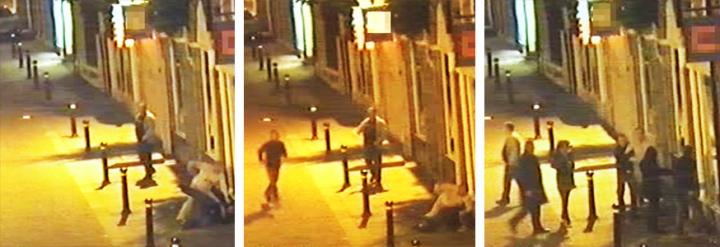Third-party conflict resolution is a human universal; similar results across three different countries

Credit: Lancaster University
Bystanders will intervene in nine-out-of-ten public fights to help victims of aggression and violence say researchers, in the largest ever study of real-life conflicts captured by CCTV.
The findings overturn the impression of the “walk on by society” where victims are ignored by bystanders.
Instead, the international research team of social scientists found that at least one bystander – but typically several – did something to help. And with increasing numbers of bystanders there is a greater likelihood that at least someone will intervene to help.
A team of researchers from the University of Copenhagen, the Netherlands Institute for the Study of Crime and Law Enforcement and Lancaster University examined unique video recordings of 219 arguments and assaults in inner cities of Amsterdam (Netherlands), Lancaster (UK) and Cape Town (South-Africa).
Lead author Dr Richard Philpot of Lancaster University and University of Copenhagen, said: “According to conventional wisdom, non-involvement is the default response of bystanders during public emergencies. Challenging this view, the current cross-national study of video data shows that intervention is the norm in actual aggressive conflicts. The fact that bystanders are much more active than we think is a positive and reassuring story for potential victims of violence and the public as a whole. We need to develop crime prevention efforts which build on the willingness of bystanders to intervene.”
Security cameras in the urban environments of Lancaster (UK), Amsterdam (Netherlands) and Cape Town (South-Africa) captured aggressive public conflicts. In 91% of situations, bystanders watching the incident intervened in several ways including:
- physically gesturing for an aggressor to calm down
- physically blocking an aggressor or pulling an aggressor away
- consoling the victim
The research further showed that a victim was more likely to receive help when a larger number of bystanders was present.
Dr Philpot said: “The most important question for the potential victim of a public assault is ‘will I receive help if needed?’ While having more people around may reduce an individual’s likelihood of helping (i.e., the bystander effect), it also provides a larger pool from which help-givers may be sourced.”
The study also found NO difference in the rates of intervention between the three cities, even though inner city Cape Town is generally perceived to be less safe. Researchers suggest that it is not the level of perceived danger that sets the overall rate of helping, rather it is any signal that the situation is conflictual and requires intervention.
The consistent helping rate found across different national and urban contexts supports earlier research “suggesting that third-party conflict resolution is a human universal, with a plausible evolutionary basis”.
In contrast to the idea that we live in a ‘walk-on by society’ – where people never get involved – the high levels of intervention found in this study across different national and urban contexts suggests that intervention is the norm in real-life inner-city public conflicts.
###
This work was supported by the Danish Council for Independent Research as awarded to project principal investigator Prof. Marie Rosenkrantz Lindegaard.
Media Contact
Gillian Whitworth
[email protected]
Related Journal Article
http://dx.




